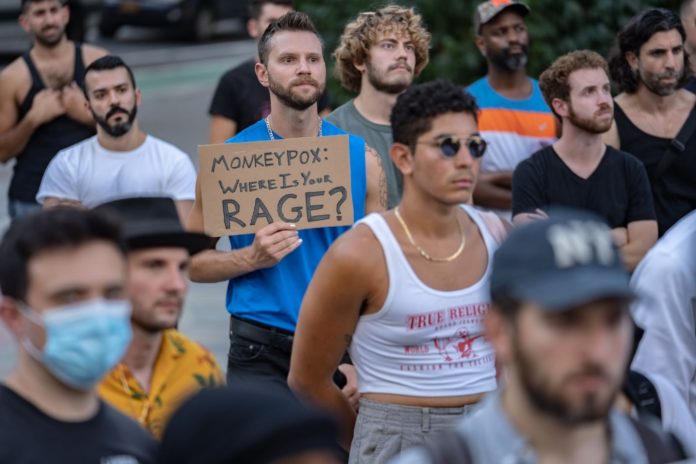
“If this article doesn’t scare the s— out of you, we’re in real trouble,” Kramer wrote. He demanded that his fellow gay men confront the political establishment that was impassively watching them die. But he also upbraided gay men who balked at calls to alter their own sexual behaviors to prevent AIDS’s spread.
Today, in the face of the ballooning monkeypox outbreak, gay and bisexual men, among whom almost all 9,492 U.S. diagnoses have occurred, stand at a similar crossroads. A virus transmitting overwhelmingly via sexual contact between men is causing great suffering. And while public health leaders now robustly support gay men, they are still failing to provide timely prevention and treatment and are often fumbling the messaging.
As during the AIDS crisis, gay men cannot wait for the government. We need to change our sexual behavior now. We must do this as an act of empowerment to protect ourselves.
Until a time when monkeypox hopefully abates, this can and should mean reducing our number of partners, skipping sex parties, practicing monogamy and even being abstinent.
Gay men have an awesome history of coming up with such homegrown public health solutions. During the early 1980s, gay activists launched a safer-sex movement that (often contentiously) confronted the heady post-Stonewall liberation of the previous decade. Ultimately, the push helped dramatically reduce sexual risk taking. HIV transmissions dropped among gay men accordingly.
In more recent decades, safer-sex fatigue, along with the arrival of effective HIV treatments and the HIV prevention pill, PrEP, have sent gay men on an overall shift back to higher-risk sexual practices. The rise of hookup apps has further fueled a sexual-liberation renaissance among many gay men — who have been left reeling since monkeypox suddenly reconnected sex with virus-related terror.
Gay men who have looked to the government for answers on how to cope with this frightening new reality have been met with a public health establishment that has often seemed more fearful of their responses to monkeypox-prevention messaging than of the virus itself. Many officials have shied away from clear statements about how the public can best protect themselves. Crucially, they have often failed to communicate emerging scientific theories that if men avoid anal sex — or perhaps use a condom during intercourse — they might at least limit some of the most devastating monkeypox symptoms, including severe proctitis.
Centers for Disease Control and Prevention officials, including the White House’s new monkeypox deputy, Demetre Daskalakis, frequently play down the central role sex between men plays in monkeypox transmission and overemphasize the uncommon cases that transmit through other means. The agency can’t even bring itself to use the words “gay” or “men” in its monkeypox safer-sex materials.
This reluctance is driven by an entrenched belief that telling gay men to alter our sexual practices is intrinsically homophobic or stigmatizing. The notion is partly understandable; it acknowledges that such demands could backfire, given an all-too-human resistance to being told what to do in private matters, especially within a community whose sex lives have a history of being criminalized. It also acknowledges that anti-LGBTQ policies and sentiment (including monkeypox-driven attacks) are on the rise, and that a segment of the country still wields gay men’s sexual norms to justify discrimination.
However, this thinking also patronizes gay men as perennial adolescents determined to defy any whiff of paternalism regardless of the cost to themselves or the community at large.
Just as we gay men deserved to know our disproportionate share of the monkeypox case count at the start of this outbreak, we deserve the government’s best advice on how to protect ourselves now. But we cannot just stand by until public officials realize that, too.
Reassuringly, many gay Americans are jumping into action already. Some have followed in AIDS activists’ footsteps and published sexual harm-reduction guides. Colorful infographics about safer sex are circulating on Instagram. And anecdotal evidence suggests that many gay men have indeed already changed their sexual practices to mitigate the risk of getting this virus.
More hopeful evidence of what’s possible comes from Europe. Experts have theorized that shifts in sexual behavior might be one reason Britain’s monkeypox curve has flattened. That could soon be our reality if we do what it takes today.
If the cantankerous Kramer were alive to see this crisis, he’d surely pound his fists and demand gay men do more. He would do so only because he held his gay brethren in the highest esteem and knew what we were capable of.
As he wrote in the closing of his New York Native article: “Gay men are the strongest, toughest people I know.” Let’s prove him right.








